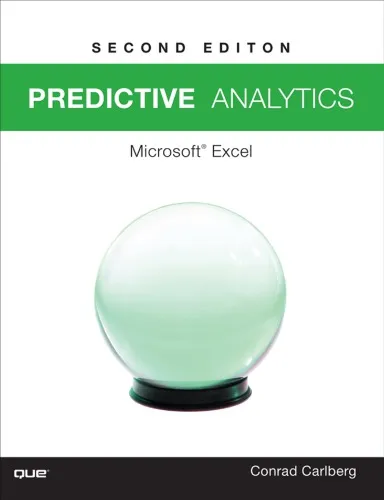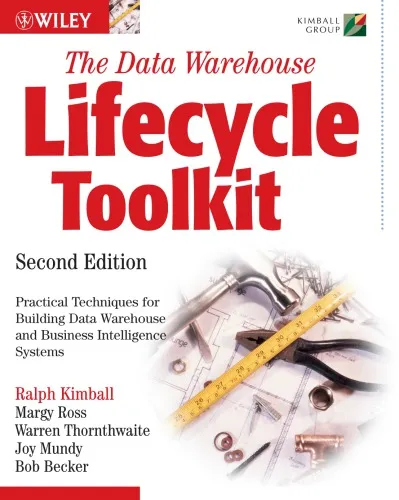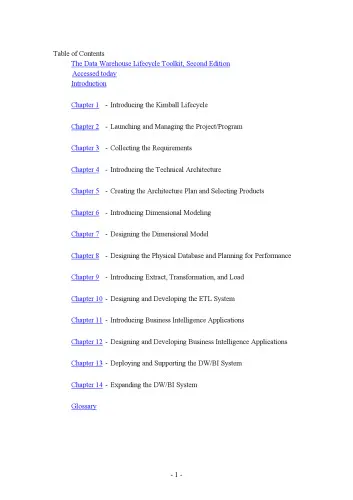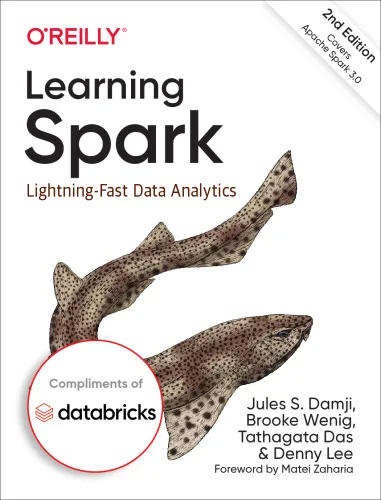Managing Data Quality: A practical guide
4.7
بر اساس نظر کاربران

شما میتونید سوالاتتون در باره کتاب رو از هوش مصنوعیش بعد از ورود بپرسید
هر دانلود یا پرسش از هوش مصنوعی 2 امتیاز لازم دارد، برای بدست آوردن امتیاز رایگان، به صفحه ی راهنمای امتیازات سر بزنید و یک سری کار ارزشمند انجام بدینکتاب های مرتبط:
خلاصه تحلیلی کتاب
کتاب Managing Data Quality: A practical guide اثری است که به شکلی مرحلهبهمرحله و کاربردی، چالشها و راهکارهای بهبود کیفیت دادهها را بررسی میکند. نویسندگان، Tim King و Julian Schwarzenbach، با اتکا بر تجربههای عملی و پروژههای واقعی، به خواننده میآموزند چگونه با استفاده از رویکردهای استاندارد و چارچوبهای معتبر، مدیریت کیفیت داده را به بخشی جداییناپذیر از استراتژی سازمانی تبدیل کنند.
این کتاب علاوه بر ارائه تعاریف دقیق از مفاهیمی چون Data Quality، به اهمیت Data Governance و پیادهسازی فرآیندهای مدیریت داده در سازمانها میپردازد. مخاطب در طول مطالعه با مدلهای ارزیابی وضعیت موجود، روششناسی اصلاح و پایش مستمر دادهها، و همچنین ابزارهای پشتیبان آشنا میشود.
محتوای کتاب از نظر ساختار آموزشی بسیار منسجم است؛ از مباحث مقدماتی گرفته تا تکنیکهای پیشرفته، به گونهای تنظیم شده است که پژوهشگران، مدیران داده، و کارشناسان IT بتوانند بهراحتی مطالب را دنبال و در عمل پیادهسازی کنند.
نکات کلیدی و کاربردی
این کتاب نهتنها جنبه نظری مدیریت کیفیت داده را پوشش میدهد بلکه ابزارهای عملی لازم برای بهبود و نگهداشت کیفیت داده در طول زمان را ارائه میکند. مباحثی همچون تعریف شاخصهای کیفی، طراحی فرآیندهای پاکسازی داده، و یکپارچهسازی Data Quality با سیستمهای Information Management از جمله بخشهای شاخص اثر هستند.
یکی از نکات برجسته، بررسی دقیق نقش Data Governance در تضمین ماندگاری کیفیت داده است. نویسندگان تاکید میکنند که هر برنامه بهبود کیفیت داده باید در چارچوبی حاکمیتی و با تعهد مدیریت ارشد انجام شود تا اثربخش باشد.
بخش عملی کتاب با مثالهای واقعی و مطالعه موردی، مسیر اجرای پروژههای ارتقای کیفیت داده را شفاف و قابل اجرا نشان میدهد. این ویژگی، کتاب را به منبعی ارزشمند برای سازمانها و پژوهشگران تبدیل کرده است.
نقلقولهای ماندگار
برخی از فرازهای کتاب، به علت عمق مفهومی و کاربردی بودن، به راحتی در ذهن خواننده باقی میمانند. این بخش به انتخاب تعدادی از این جملات اختصاص دارد که جوهره رویکرد نویسندگان را بازگو میکند.
کیفیت داده یک مقصد نیست، بلکه سفری بیپایان در مسیر بهبود و انطباق با تغییرات است. نامشخص
هیچ تصمیم مدیریتی بهتر از دادهای که بر آن تکیه دارد نخواهد بود. نامشخص
چرا این کتاب اهمیت دارد
در عصر دادهمحور امروز، کیفیت دادهها تعیینکننده میزان موفقیت سازمانهاست. کتاب Managing Data Quality: A practical guide به این ضرورت پاسخ میدهد و چارچوبی روشن برای ارزیابی، بهبود و نگهداری دادهها ارائه میکند.
اهمیت دیگر کتاب در این است که پلی میان دنیای نظری مدیریت داده و نیازهای عملی کسبوکار ایجاد میکند. با ترکیب مفاهیم Data Governance و روشهای پایش و اصلاح داده، نویسندگان مجموعهای از بهترین شیوهها را معرفی کردهاند که قابلیت استفاده در صنایع و سازمانهای مختلف را دارد.
به دلیل نبود منابع فارسی کافی در این حوزه و همچنین کمبود مطالعات موردی بومی، این کتاب میتواند مرجع ارزشمندی برای دانشجویان، محققان و مدیران داده در کشورهای فارسیزبان باشد.
نتیجهگیری الهامبخش
کتاب Managing Data Quality: A practical guide فراتر از یک راهنمای فنی است؛ این کتاب نگاهی جامع به کیفیت داده به عنوان سرمایهای استراتژیک دارد و شما را به ایجاد تغییرات پایدار در شیوه مدیریت اطلاعات سازمان تشویق میکند.
خواندن این اثر نهتنها دید شما را نسبت به اهمیت دادهها گسترش میدهد، بلکه ابزارهای لازم برای اقدام عملی را نیز فراهم میآورد. اگر به دنبال ارتقای کیفیت دادهها در محیط کاری یا پژوهشی خود هستید، این کتاب نقطه شروعی قدر
Analytical Summary
In an era where accurate, reliable, and timely information is central to organisational success, Managing Data Quality: A practical guide stands as a rigorous and actionable resource. Written by Tim King and Julian Schwarzenbach, the book bridges the critical gap between theory and pragmatic application, serving as a trusted companion for academics, practitioners, and executives striving to understand and improve data ecosystems.
This guide offers a structured examination of data quality management, grounded in both conceptual clarity and hands-on methodologies. It explores the multifaceted dimensions of data governance and information management, situating these topics within the broader context of digital transformation, regulatory compliance, and strategic decision-making. Rather than offering abstract ideals, it furnishes adaptable frameworks that organisations can tailor to their scale, sector, and maturity in data capability.
From identifying root causes of poor data quality to implementing sustainable remediation processes, the book charts a clear path for readers to navigate the complexities inherent in modern data landscapes. Deliberately avoiding buzzwords and transient concepts, the authors present enduring principles underpinned by experience and industry best practices.
Key Takeaways
The text delivers targeted, actionable insights that enable readers at varying levels of familiarity with data quality management to derive tangible improvements within their organisations.
Chief among these insights is the recognition that data quality is not a static achievement but an ongoing discipline, requiring sustained attention, governance structures, and cultural alignment. Readers will learn to identify measurable indicators of data quality, enforce accountability through well-defined roles, and integrate quality control into everyday business processes.
The secondary keywords—data governance and information management—are not treated as peripheral topics; they are interwoven throughout the book as foundational pillars. Lessons extend beyond purely technical considerations, encompassing organisational behaviour, policy-making, and the economic impacts of quality initiatives.
Memorable Quotes
“Data is an asset whose value is defined by its accuracy, completeness, and relevance.”Unknown
“Quality information enables quality decisions; poor data leads directly to organisational risk.”Unknown
“Managing data quality is a shared responsibility, not a departmental checkbox.”Unknown
Why This Book Matters
For professionals who recognise that flawed data erodes trust, efficiency, and competitive advantage, this book provides both illumination and guidance.
Managing Data Quality: A practical guide is essential because it acknowledges the interplay between technology, human oversight, and policy. It deals not merely with detecting errors, but with embedding a culture that prevents them. The advice is applicable across industries, from the public sector where data governance is bound by statutory requirements, to commercial enterprises managing extensive information portfolios.
The authors’ experience ensures that strategies are realistic, and while the publication year and possible awards are listed as "Information unavailable" due to no reliable public source, the enduring relevance of its content is undeniable.
Inspiring Conclusion
Ultimately, Managing Data Quality: A practical guide invites readers to treat data not as a byproduct, but as a carefully nurtured asset central to organisational vitality.
By absorbing its lessons and applying them, stakeholders can foster an environment where accurate, relevant, and timely information drives every decision. Whether you are an academic seeking structured models, a professional aiming to refine operational processes, or a leader taking charge of strategic data governance, this book offers the roadmap you need. The next step is clear: read, reflect, and discuss its principles with peers to embed them deeply within your practice.
دانلود رایگان مستقیم
شما میتونید سوالاتتون در باره کتاب رو از هوش مصنوعیش بعد از ورود بپرسید
دسترسی به کتابها از طریق پلتفرمهای قانونی و کتابخانههای عمومی نه تنها از حقوق نویسندگان و ناشران حمایت میکند، بلکه به پایداری فرهنگ کتابخوانی نیز کمک میرساند. پیش از دانلود، لحظهای به بررسی این گزینهها فکر کنید.
این کتاب رو در پلتفرم های دیگه ببینید
WorldCat به شما کمک میکنه تا کتاب ها رو در کتابخانه های سراسر دنیا پیدا کنید
امتیازها، نظرات تخصصی و صحبت ها درباره کتاب را در Goodreads ببینید
کتابهای کمیاب یا دست دوم را در AbeBooks پیدا کنید و بخرید
1230
بازدید4.7
امتیاز0
نظر98%
رضایتنظرات:
4.7
بر اساس 0 نظر کاربران
Questions & Answers
Ask questions about this book or help others by answering
No questions yet. Be the first to ask!


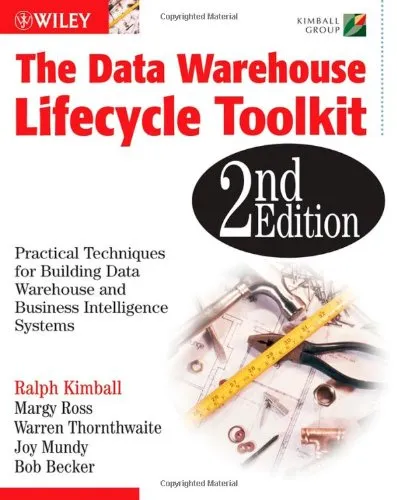




![Practical Data Quality: Learn practical, real-world strategies to transform the quality of data in your organization [Team-IRA]](https://s3.refhub.ir/images/thumb/Practical_Data_Quality__Learn_practical__real_38764.webp)


